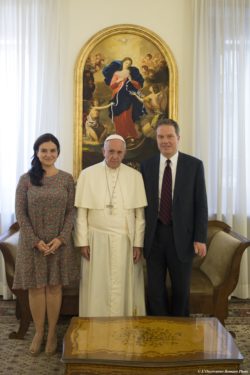By John L. Allen Jr.

ROME (Crux) — When news broke on New Year’s Eve that the Vatican’s two official spokespersons, American Greg Burke and Spaniard Paloma Garcia Ovejero, had resigned, words such as “sudden” and “unexpected” figured in many headlines.
One understands the point, as there had been no advance indication their exits were imminent. However, to be completely honest, I didn’t find the move “unexpected” at all, since I’ve been anticipating it since the two were appointed in 2016.
The reason is simple: Burke and Garcia Ovejero are, at heart, journalists, and journalists just aren’t meant to be corporate mouthpieces.
Both, of course, are devout Catholics, and so when the Church asked them to serve, they said yes. Yet, that’s precisely the point – the Church arguably should have known better than to ask, because both Burke and Garcia Ovejero are more valuable on the outside looking in rather than the other way around.
Burke is a veteran American journalist with deep knowledge of Rome and the Vatican. He started out back in the day with the Catholic press, then made his way to Time and Fox News. Garcia Ovejero was the Rome correspondent for the Spanish radio network COPE, the official radio outlet of the Spanish bishops and the second largest radio platform in Spain, where she was known as perhaps the hardest-working journalist in town as well as an incredibly generous and supportive colleague.
Perhaps things would have been different had Burke and Garcia Ovejero been given a real opportunity to shape the Vatican’s message, with direct access to the boss and a meaningful role in the decision-making process. That, however, was never how their roles were conceived – they reported to the Vatican’s Secretariat of State, not Francis directly, which means you had journalists dependent on bureaucrats.
Honestly, that’s never a prescription for success. (Had anyone in power at the Vatican consulted working journalists before this happened, a lot of the heartache might have been avoided.)
Rather than advising Francis on how certain decisions or statements will be received before the fact, so that misunderstandings can be avoided and the intended signals actually get across, Burke and Garcia Ovejero were reduced to either managing incidental aspects of the communications enterprise – tweets and Instagram postings, for instance – or basic maintenance of the Press Office itself.
Those tasks do not require highly talented, creative and driven journalists to perform.
Let’s be clear – it’s not as if their run at the Vatican Press Office was a flop.
On the contrary, they injected a more relaxed and human ethos to the Press Office, making it a place where journalists actually felt treated with respect and basic courtesy. (That may not seem like much, but believe me, over the last 20 years or so it hasn’t always been the case.)
Further, they pioneered new ways of delivering information – informal “meeting points” between newsmakers and reporters, for instance, steering clear of lengthy prepared statements and making more efficient use of time. They made papal trips user-friendly, another aspect of the experience that couldn’t always be taken for granted.
They understood that the Vatican is an international beat, ensuring that solid translations of important texts were available in the key languages. Details about events, breaking news and developments in stories were relayed in real time, making use of apps such as Telegram.
Both Burke and Garcia Ovejero understand deadline pressures, responding to phone calls and messages in real time – in Garcia Ovejero’s case, even at 3 a.m., making many of us wonder when she ever slept. Both also understand the kinds of questions reporters are compelled to ask, not getting rattled or defensive when they came.
Neither Burke nor Garcia Ovejero played favorites, giving preferred journalists or outlets special treatment, which had been a hallmark of the way the system worked since time immemorial.
For all that and much more, anyone who’s had dealings with the Vatican Press Office since they took over owe Burke and Garcia Ovejero a debt of gratitude.
However, it had to be a frustrating situation for both of them, living every day with the gap between the realities of their situation and what might have been.
Given that such a gap is basically hard-wired into the way the Vatican handles communications – which, by the way, is unlikely to change despite all the turnover of recent weeks – it’s fair to say that Burke and Garcia Ovejero always were destined to hit a wall.
One way of thinking about it is opportunity cost.
Suppose over the last two years, a pair of extremely talented reporters – people who have excellent contacts, who understand the context of breaking news deeply, and who always get their facts right – had been in a position to tell the story of the clerical sexual abuse crisis, for instance, or the internal tensions unleashed in the Pope Francis era, or the stillborn Vatican financial reform.
By so doing, those reporters could have exposed bureaucratic stalling and misconduct, promoted a better-informed public understanding of the papacy, and perhaps even compelled the Church to clean up its act in some key areas.
Now ask yourself: Would that have been a better use of their time than running what amounts to a gigantic PR copy machine?
In any event, here’s a prediction: We haven’t heard the last of either Burke or Garcia Ovejero on the Vatican beat. Honestly, I suspect their best days lie ahead, as they make their way back to the side of the street where they probably always belonged.
